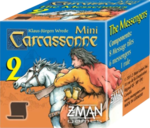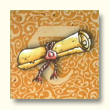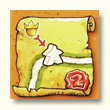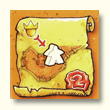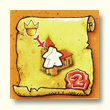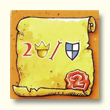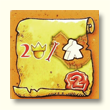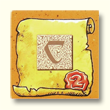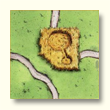Die Depeschen (Erste Edition)
 |
You are reading the rules for this tile design. |
 | Read the following rules if your tiles look like this. |  |
| If your tiles have a different design, then choose a game from Spin-offs. |  |
The King has dispatched messages to his loyal subjects who have expanded his territory. Messengers are hurrying to deliver the King’s gifts.
Allgemeine Informationen und Kommentare
 Erweiterungssymbol |
Die Depeschen (Mini #2) wurde ursprünglich von Hans im Glück in 2012 veröffentlicht.
Diese Erweiterung wurde für das Grundspiel entwickelt. Die Regeln des Grundspiels gelten unverändert. Es kommen nur die unten aufgeführten Regeln dazu.
Spielmaterial
- 6 Weibliche Geflogsleute in 6 Farben
- 8 Depeschen Karten
- 1 Karte für Kornkreise II
Regeln
Vorbereitung
One player shuffles the Message tiles and places them upside down (as a stack) beside the scoreboard. Each player places the woman follower in his or her color in addition to his normal follower on the zero of the scoreboard. There are now, therefore, two counting figures on the scoreboard for each player.
Placing a tile
There are no land tiles specific to this expansion.
Deploying a follower
The followers in this expansion are not placed on the standard land tiles as part of the game.
Scoring
Whenever a player scores points during the game, he or she can choose which one of the two scoring figures to move forward on the scoreboard. The active player (and only that player) gets a Message tile if one of his two counting figures lands on a dark number space (0, 5, 10, 15,...). The active player takes the top tile from the stack of Message tiles and turns it over. He or she has two options, either:
- Perform the action of the Message
- or
- Score 2 points immediately (shown in the seal on the lower right corner of the tile)
After the player has carried out his or her choice, he or she places the Message tile face down at the bottom of the Message stack.
The Messages in detail
The player selects a road on which he or she has at least one follower (the player does not need to have a majority of followers, just needs to be represented). If there is more than one road to choose from, the player must select the one that would be worth the fewest points when scored at the end of the game. [1] [2] The player receives the number of points the road would be worth if it were the end of the game. [3] The player’s follower remains on the road.
The player receives 2 points for each pennant in each city where he has at least 1 follower - the player does not need the majority of followers in a city.
The player receives 2 points for each of his or her knights (followers in a city). [7] The knights remain in the game.
The player gets 2 points for each of his or her farmers (followers on a farm). The farmers remain in the game.
The player chooses one of his or her followers in play. If the player has the majority in the feature where the selected follower stands, he or she scores that feature (only for himself or herself) as if it were the end of the game. The player then puts the chosen follower back in his or her supply. [11] [12] [13]
More rules
If more than one feature is scored on a single turn, the entire point value for each individual feature must be scored by moving a single counting follower. [14] [15]
The active player can receive only one Message from a round of scoring [16] [17] even if, for example, both scoring figures end up on dark number fields after the scoring of several finished features. However, if the active player gets points from a Message, it is possible that he or she could move a counting follower and receive another Message, playing it in the same turn. Chains of scoring in this way can continue indefinitely. [18] [19]
Important: Only the active player can receive Messages, even if other players’ counting figures land on dark fields on the scoring track.
The point values of both counting figures are added together at the end of the game to produce the player’s final score. [20] Each player places a counting figure on that total and puts the other back in the box. In the final scoring, no further Messages are received, even if a counting figure lands on a dark field.
Rounds of Scoring
>> Conventional turn [21]
Placing a tile
Placing a follower
- Round 2 - End of “move wood” phase:
- Abbot removal scoring
- Shepherd after "Herd flock into stable" action
- Acrobat pyramid scoring
- Fruit-bearing tree action
Scoring a feature
- Round 3 - Scoring phase:
- Bonus scoring (pre): Watchtower, Tollhouse
- Feature scoring: City, Road, Monastery, Castle, etc.
- Bonus scoring (post): Markets of Leipzig, Fairy 3 points, Ringmaster points, Teacher
- Circus scoring
Additional actions
- Round 4 - End of turn:
- Catapult points
>> Double turn from builder
- As in conventional turn, except Fairy point is omitted in second part of the turn [24]
>> Variable
- Points from the action of a message
The crop circles addition
In each mini, you will find a tile of the 7th mini expansion ![]() Crop Circles. This expansion is playable with only a single tile, but it is best to play with all 6 tiles. [25]
Crop Circles. This expansion is playable with only a single tile, but it is best to play with all 6 tiles. [25]
Tile Distribution
Referenzen
Für Lizenzen und Erklärungen besuche Icons page.
- ↑
 The 2013 rules have a slightly clearer wording than the 2012 version. (11/2013)
The 2013 rules have a slightly clearer wording than the 2012 version. (11/2013)
- ↑ Jump up to: 2.0 2.1 2.2
 The scoring for Messages 1, 2 and 3 only considers those points related to the feature. No bonus associated to any figures placed on the feature are taken into consideration, since the focus of this message is scoring the feature. Those bonus points for figures would be scored when the feature is properly scored.
The scoring for Messages 1, 2 and 3 only considers those points related to the feature. No bonus associated to any figures placed on the feature are taken into consideration, since the focus of this message is scoring the feature. Those bonus points for figures would be scored when the feature is properly scored.
- ↑
 Note that this could be 0 points if a road with one of the player’s followers has an inn on it.
Note that this could be 0 points if a road with one of the player’s followers has an inn on it.
- ↑
 Note that this could be 0 points if the smallest city with one of the player’s followers contains a cathedral.
Note that this could be 0 points if the smallest city with one of the player’s followers contains a cathedral.
- ↑
 This message would apply to all features considered proper cloisters:
This message would apply to all features considered proper cloisters:
- Cloisters
- Shrines / cult places
- Abbeys
- German monasteries
- Dutch & Belgian monasteries
- Japanese buildings
- Darmstadt churches
- ↑
 There is no official clarification stating whether this message should consider special monasteries (German monasteries, Dutch & Belgian monasteries and Japanese buildings) with a follower placed as an abbot. The original rules were created before the special monasteries where released, so this case is not considered. However, the rules contain no limitations that would prevent players from considering special monasteries with a follower placed as an abbot. In this case, we will apply the general rule provided by Georg Wild: "If an older expansion only mentions the word monk, this does not exclude follower placed as an abbot on a German monastery." (7/2014) This will also apply to Japanese Buildings and Dutch & Belgian monasteries.
See: http://www.carcassonnecentral.com/community/index.php?topic=781.msg9971#msg9971
There is no official clarification stating whether this message should consider special monasteries (German monasteries, Dutch & Belgian monasteries and Japanese buildings) with a follower placed as an abbot. The original rules were created before the special monasteries where released, so this case is not considered. However, the rules contain no limitations that would prevent players from considering special monasteries with a follower placed as an abbot. In this case, we will apply the general rule provided by Georg Wild: "If an older expansion only mentions the word monk, this does not exclude follower placed as an abbot on a German monastery." (7/2014) This will also apply to Japanese Buildings and Dutch & Belgian monasteries.
See: http://www.carcassonnecentral.com/community/index.php?topic=781.msg9971#msg9971
- ↑
 You will consider for Message #5 the number of your followers placed in cities (knights): normal followers, big follower, mayor, wagon, ringmaster, guard followers, phantom. Their strength (majority votes) is irrelevant.
Note that Carcassonne II abbots cannot be knights. Any follower placed on a cloister within a city will be a monk and will not be counted as a knight. These are examples of cloisters within a city from Exp. 3 and Exp. 8 where a monk can be placed within a city:
You will consider for Message #5 the number of your followers placed in cities (knights): normal followers, big follower, mayor, wagon, ringmaster, guard followers, phantom. Their strength (majority votes) is irrelevant.
Note that Carcassonne II abbots cannot be knights. Any follower placed on a cloister within a city will be a monk and will not be counted as a knight. These are examples of cloisters within a city from Exp. 3 and Exp. 8 where a monk can be placed within a city:


- ↑
 The initial rules on the HiG website had a tile scoring 3 points per farmer instead, but this was evidently a pre-production plan that was changed before publication. Additionally, the RGG rules also describe the tile as worth 3 points, but the actual tile included is for 2 points.
The initial rules on the HiG website had a tile scoring 3 points per farmer instead, but this was evidently a pre-production plan that was changed before publication. Additionally, the RGG rules also describe the tile as worth 3 points, but the actual tile included is for 2 points.
- ↑
 The placement of this tile follows a normal turn with all its phases. As indicated in another clarification, the placement of this extra tile may even become a double turn. The player may also receive additional messages.
The placement of this tile follows a normal turn with all its phases. As indicated in another clarification, the placement of this extra tile may even become a double turn. The player may also receive additional messages.
As in a normal turn, players may decide to use a tile in their supply instead of drawing a new one, such as:- An abbey tile (
 Exp. 5 - Abbey & Mayor)
Exp. 5 - Abbey & Mayor) - A German castle tile (
 Castles in Germany)
Castles in Germany) - A Halfling tile (
 Halflings)
Halflings)
- An abbey tile (
- ↑
 If a tile is added to a feature with a builder and triggers the drawing of Message #7, The Message extra tile comes before the builder extra turn. If the extra tile from the Message is put on the builder’s feature, this will create another builder extra turn. Thus, the events would be: initial turn => Message #7 turn => Message #7 builder turn => original tile’s builder turn. (11/2013)
If a tile is added to a feature with a builder and triggers the drawing of Message #7, The Message extra tile comes before the builder extra turn. If the extra tile from the Message is put on the builder’s feature, this will create another builder extra turn. Thus, the events would be: initial turn => Message #7 turn => Message #7 builder turn => original tile’s builder turn. (11/2013)
- ↑
 Note that you can score 0 points. This scenario may cover:
Note that you can score 0 points. This scenario may cover:
- A thief on road with an inn
- A knight in city with a cathedral
- A knight on besieged city
- A farmer in farm with no completed cities
- A mayor in city with no pennants
- A mayor on castle token
- A lord/lady on castle token
- You do not have the majority
- ↑
 Any bonus points associated to the figure being removed will be scored as if at the end of the game, such as, fairy 3-point scoring bonus or the ringmaster bonus.
Any bonus points associated to the figure being removed will be scored as if at the end of the game, such as, fairy 3-point scoring bonus or the ringmaster bonus.
- ↑
 Any other followers belonging to you or other players remain on the feature, as it is still incomplete.
Any other followers belonging to you or other players remain on the feature, as it is still incomplete.
- ↑
 If, for example, a city and a road are completed and scored by the active player, a different counting follower could be moved for each feature. However, all points scored by that city must be moved by one counting follower, and all points scored by that road must be moved by one counting follower.
If, for example, a city and a road are completed and scored by the active player, a different counting follower could be moved for each feature. However, all points scored by that city must be moved by one counting follower, and all points scored by that road must be moved by one counting follower.
- ↑
 In order to trigger a Message, the landing on a dark space will take into consideration any scoring moving forward a scoring figure on the scoreboard (including stolen points or payments received). No backwards movements of scoring figures landing on a dark space (due to payments) will be considered.
In order to trigger a Message, the landing on a dark space will take into consideration any scoring moving forward a scoring figure on the scoreboard (including stolen points or payments received). No backwards movements of scoring figures landing on a dark space (due to payments) will be considered.
- ↑
 The rules refer to "rounds of scoring," since all features (or figures) scored in one "round of scoring" are counted together, and only at the end of a "round of scoring" is it determined if a scoring figure is on a dark space. (10/2014)
The rules refer to "rounds of scoring," since all features (or figures) scored in one "round of scoring" are counted together, and only at the end of a "round of scoring" is it determined if a scoring figure is on a dark space. (10/2014)
- ↑
 Depending on the number of expansions used, there are a number of different rounds of scoring that could occur over the course of a turn. See the heading at the end of the Messages section for a list of separate rounds of scoring. Payment of points, as with bidding in a bazaar or in ransoming of a follower captured by a tower, does not count as a round of scoring. (10/2014)
Depending on the number of expansions used, there are a number of different rounds of scoring that could occur over the course of a turn. See the heading at the end of the Messages section for a list of separate rounds of scoring. Payment of points, as with bidding in a bazaar or in ransoming of a follower captured by a tower, does not count as a round of scoring. (10/2014)
- ↑
 If there is a double turn because of a builder, the placement of the second tile would create at least another round of scoring (at the end of Scoring a feature), and thus another opportunity (or several, depending on the expansions used) to get a Message. (1/2013, updated 2/2020)
If there is a double turn because of a builder, the placement of the second tile would create at least another round of scoring (at the end of Scoring a feature), and thus another opportunity (or several, depending on the expansions used) to get a Message. (1/2013, updated 2/2020)
- ↑
 Scoring 1 point for possession of the fairy is a separate scoring event, so it can trigger an opportunity to receive a Message by itself. Likewise, scoring 3 points for placement of a Windrose is a separate event and can also can trigger an opportunity to receive a Message by itself. (updated 5/2014)
Scoring 1 point for possession of the fairy is a separate scoring event, so it can trigger an opportunity to receive a Message by itself. Likewise, scoring 3 points for placement of a Windrose is a separate event and can also can trigger an opportunity to receive a Message by itself. (updated 5/2014)
- ↑
 In other words, both counting followers are considered equally, with no differences between the two.
In other words, both counting followers are considered equally, with no differences between the two.
- ↑
 The rounds of scoring are numbered to match the Order of Play.
The rounds of scoring are numbered to match the Order of Play.
- ↑
 Scoring 1 point for possession of the fairy is a separate scoring event, so it can trigger an opportunity to receive a Message by itself. (5/2014)
Scoring 1 point for possession of the fairy is a separate scoring event, so it can trigger an opportunity to receive a Message by itself. (5/2014)
- ↑
 Scoring 3 points for placement of a Windrose is a separate event and can also can trigger an opportunity to receive a Message by itself. (5/2014)
Scoring 3 points for placement of a Windrose is a separate event and can also can trigger an opportunity to receive a Message by itself. (5/2014)
- ↑
 Some other actions may only take place once during a double turn but they will not affect messages:
Some other actions may only take place once during a double turn but they will not affect messages:
- Prisoner ransom
- Claiming an unclaimed tunnel portal.
- Take flight from the Plague (once an infestation is active).
- Spreading the plague by placing a flea token (once an infestation is active), if the tile placed is not a new plague source.
- ↑
 Note that the Crop Circle tiles included in the mini expansions are different from the tiles released in the initial Crop Circles expansion (referred to as "Crop Circles I").
Note that the Crop Circle tiles included in the mini expansions are different from the tiles released in the initial Crop Circles expansion (referred to as "Crop Circles I").
